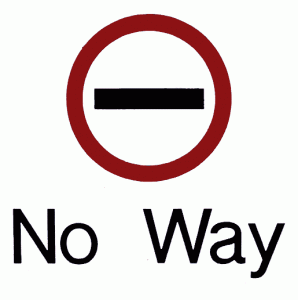In the September 18, 2012 Ask The Headhunter Newsletter, a job hunter asks how to parlay his considerable academic credentials into a good job:
Here’s hoping you can knock some sense into me. The job search process has me bewildered. I have a degree in computer science and I had begun a doctoral program, but must now re-enter the job market. I am considered overqualified for much of what passes for entry-level positions, and realistically I would be under-challenged in them. Yet I have little in the way of a “track record” that would be of interest to employers looking for someone with a more specialized background. I have tried to sell my skills, but have only gotten form-letter acknowledgements. Any suggestions on getting to first base? Thanks.
My Advice
 No offense, but nobody’s buying what you’re selling.
No offense, but nobody’s buying what you’re selling.
You say you have little in the way of experience to offer an employer in your field. That’s patently untrue, but it’s a common error in judgment that lots of new grads make.
Much of the experience and many of the skills you’ve acquired in school can transfer to the work world, but you need to do the mapping. (An employer won’t figure it out for you.)
What you’re selling isn’t what you’ve done. It’s what you can do.
Make a list of all the “hands-on” work you have done related to the kind of work done in your field — the kind of work you want to do. The work you’ve done might include academic projects, if it’s relevant to the jobs you want. People tend to dismiss their academic work because it’s academic. It can still be hands-on, it’s still experience, and it can be very valuable to an employer if you can show how.
Then put that list aside, because it’s totally useless without what we’re going to do next. (That’s why it doesn’t sell!)
Focus on the work the employer needs done. You must research and understand it before you can do any “mapping” of your skills. (Your skills are useless unless someone needs them!) That means learning about each target company and talking to people who work there. Try to describe the work you discover in terms of tasks — things you would have to do. Be as detailed as possible.
Then review each item, and describe how you could shape and apply each of your skills and experiences to help get the work done in a way that positively impacts the employer’s bottom line.
That is, how would hiring you be a benefit? (You can work through this process best if you focus on one company at a time.)
Remember that some of your skills are very fundamental, and these are the ones that can be best generalized to a specific job. For example, organizational skills, analytical skills, writing skills, and so on. The challenge is to find ways to apply them to the one job you’re pursuing. That is what an employer wants to see — not your resume. That’s what employers pay for.
This is what you’re selling.
I’ll say it again: As you do this mapping, be very specific. Sometimes, the inability to get specific stems from not really knowing what a company really needs. This is where your general research skills come in: Research the heck out of a company and its business. If  you don’t, then you can’t demonstrate what you can offer, and you don’t deserve the job. (I discuss these techniques in more detail in The Library Vacation and Put a Free Sample in Your Resume, two key sections of the PDF book, How Can I Change Careers?)
you don’t, then you can’t demonstrate what you can offer, and you don’t deserve the job. (I discuss these techniques in more detail in The Library Vacation and Put a Free Sample in Your Resume, two key sections of the PDF book, How Can I Change Careers?)
Don’t worry that a job is beneath you. You will probably have to take an entry-level position to start. Don’t carry a negative attitude about this; it’s a necessary part of starting a career. It’s how employers decide you’re worth trusting with more sophisticated work. The point is to find a job in a company where you’re working with people who will offer you more and better work soon.
Give this an honest shot by looking at yourself through an employer’s eyes. You see, employers want one thing: to have a problem solved. Most won’t take the time to tell an outsider what that is. Offering value and solutions before you’re asked is the best way to find work.
I wish you success.
How did you get your first job out of school? What could this reader do to make you want to hire him? I think schools absolutely suck at teaching students how to find jobs. Why???
: :












